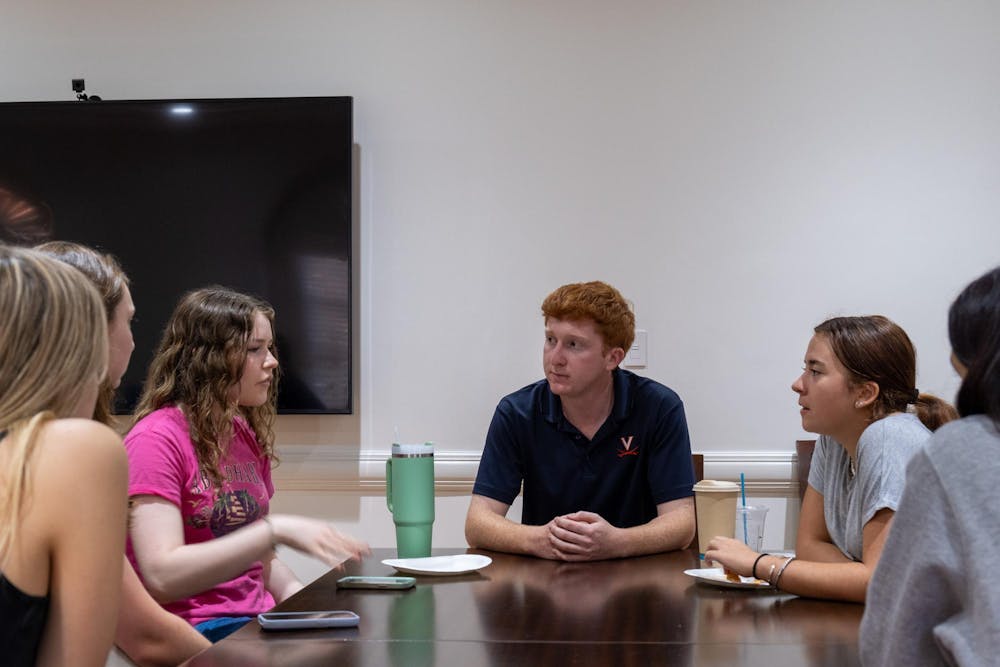Students gathered in the Rotunda Wednesday evening for a conversation on political violence in the wake of the assassinations of Charlie Kirk and Minnesota lawmaker Melissa Hortman. Those in attendance engaged in dialogue that dove into the partisan divide and were asked to examine ways they can individually find solutions to political polarization in their communities.
The event was hosted by Middle Grounds, a nonpartisan, student-run club that aims to spark political conversations across ideological boundaries, leading discussions to bridge partisan divide on Grounds. The CIO was established in 2022 as a chapter of Bridge USA, a nonprofit organization, youth movement aimed to combat political division. The event was also co-sponsored by Think Again, an initiative promoting freedom of speech at the University that operates under the Karsh Institute of Democracy.
The event entailed students breaking into groups and discussing topics such as social media’s role in political violence and misinformation, as well as potential solutions, how leaders should respond and what conditions in American society may contribute to ongoing violence.
Jacob Rabin, president of Middle Grounds and fourth-year College student, guided the event and said he hoped the conversations would help foster connection between students.
“I think this kind of stuff is very important … to bring people together,” Rabin said. “I’m really optimistic that we can have some good conversations, and that you guys walk away feeling a little better, at least like you’re making a little bit of progress.”
Rabin said that due to recent media coverage and widespread response to increasing political violence, he thought it was necessary for students to engage in community discussions that would bridge the divide on controversial issues.
“A lot of the time we get stuck in echo chambers of having conversations with people that we are similar to and have the same ideas and beliefs,” Rabin said. “Watching Charlie Kirk get shot and then seeing the reactions across the world afterwards struck me. Struck everybody.”
After small group discussions, groups shared their thoughts with the room, prompting disagreements that challenged students to engage with their own viewpoints as well as other people’s viewpoints.
“A lot of people feel like their voices are unheard, like there’s policy movements that everybody kind of agrees on but nothing happens to change it,” one student said in their small group. “Maybe if there’s a more direct line, from voting and political advocacy to action … maybe you’d see people more involved politically.”
Rabin also led a conversation about Middle Grounds' own role in combating partisan divide and how students can approach the problem, as well. Attendees mentioned having political conversations with their own family members, reaching communities with limited educational opportunities, and the effectiveness of student dialogue events and how they represent students' political involvement.
“I think it’s easy to say, for us as college-educated people that we can change the world in some way, but the majority of these acts are not happening from people who are taught by higher education,” one attendee said.
Another student said, in response, that they think political engagement at the University could increase as a result of these conversations.
“If you look at the voting percentage of people here, like most people in the U.S don’t vote. Probably everyone here in this room voted in elections,” the student said. “I mean, it shows you how politically engaged people at U.Va are … I mean sure, right now, nothing’s going to change instantly, but I do think it has a big impact.”
While many students had some ideas contested by other attendees, the dialogue between students was consistently a civil exchange of political ideas. Lily Bass, vice president of Middle Grounds and third-year College student, emphasized the role of these stimulating conversations and the aim of such events hosted by Middle Grounds.
“This isn’t supposed to be a debate,” Bass said. “It’s supposed to be a conversation … for both sides of the aisle to reach healthy conclusions.”
While political violence is a larger national concern, one student said they think starting with small discussions is a way to make a difference.
“I think it’s important to start small with your community. Like one thing we talked about earlier was having resources and good nonprofits,” one student said about the event. “But if you can make those strong I think it would help, it’s hard to influence a whole national population.”
Some of the next Think Again and Middle Grounds events include inviting students to disagree with professors Oct. 17 and a speechwriting workshop Oct. 20 with former presidential speechwriter Mary Kate Cary.







